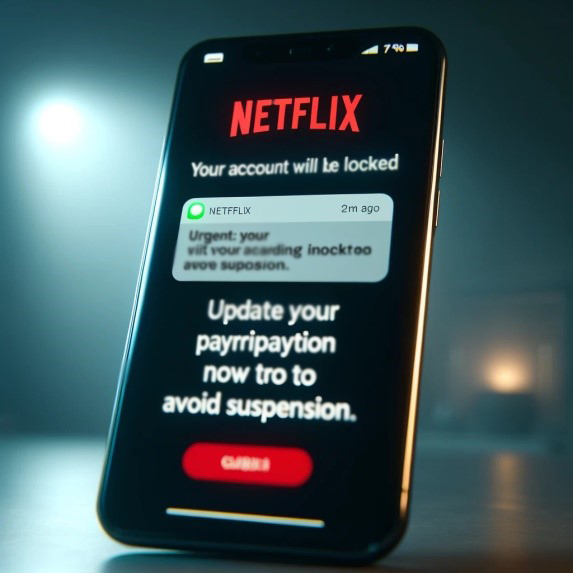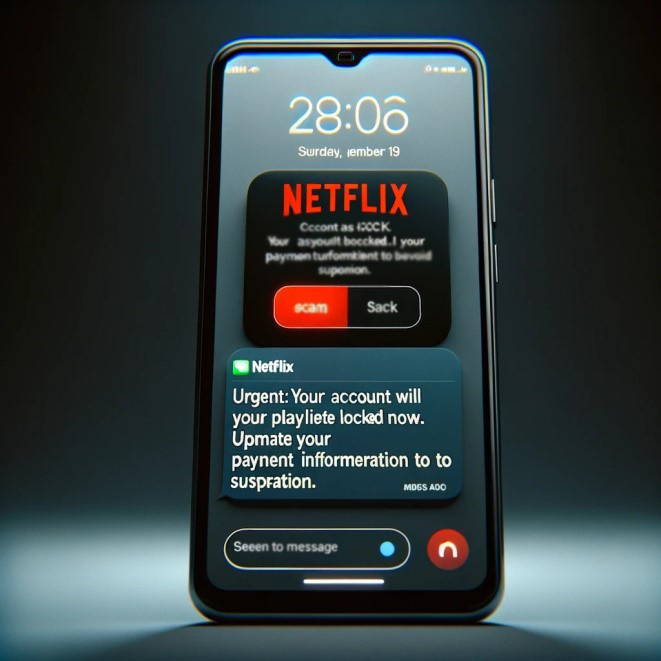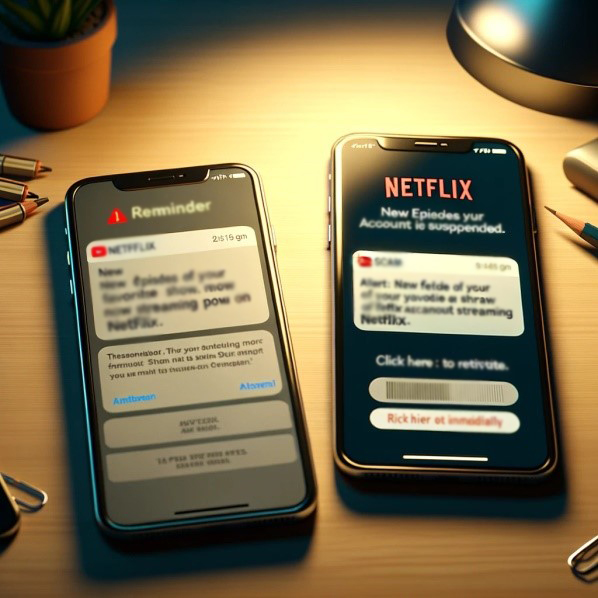Netflix Text Scam
As we live in a digital age, where technology affects every part of our lives, the frequency and sophistication of digital scams have escalated dramatically. From email phishing to social media frauds, cybercriminals are constantly devising new ways to exploit unsuspecting individuals. One of the latest schemes gaining traction is the Netflix text scam, a cunning new twist in the saga of online deception.
The Netflix text scam typically manifests as an SMS or text message that falsely claims to be from Netflix. These messages might alert you that your account will be suspended If you don’t update your payment details, or they may offer a non-existent free subscription period as bait. Such messages are prime examples of phishing sms Netflix tactics, aiming to steal personal and financial information. Unfortunately, this particular Netflix scam text preys on the vast subscriber base of the streaming giant, making it a potent threat to a broad audience.
Understanding and recognizing these Netflix scams via text is crucial for all digital users. Awareness and vigilance are your best defenses against these schemes. By staying informed about the nature of these scams and the common tactics used by scammers, you can better safeguard your sensitive information and navigate the digital world with greater confidence. Furthermore, educating yourself and others about these threats is an essential step in creating safer online environment for everyone.
Through this blog, we delve deeper into the mechanics of the Netflix scam text message, offering insights and advice on how to detect and avoid falling victim to such nefarious tactics. By the end, you’ll be better equipped not only to protect yourself but also to help others in your circle stay safe in the face of these ever-evolving digital threats.
What is the Netflix Text Scam?
The Netflix text scam is a sophisticated form of phishing sms Netflix that targets unsuspecting users with fraudulent messages purporting to be from the popular streaming service. This scam is designed to trick people into disclosing sensitive information, like login passwords and payment details, through deceitful communications.
At the core of the scam are the Netflix scam text messages that often contain alarming or enticing claims to capture the recipient’s attention. One common tactic involves a message suggesting that the user’s Netflix account has been suspended or is about to be canceled due to payment issue. The message urges the receiver to click on a link to update their payment details or to reactivate their account. This link leads to a fake Netflix login page, meticulously designed to collect the user’s credentials and credit card information.
Another variant of the Netflix phishing text might offer an attractive but fictitious promotion, such as a free or discounted subscription period. The message claims that to avail of the offer, the user must re-confirm their account details, leading them once again to a fraudulent website.
Examples of common phishing texts claiming to be from Netflix include:
- “URGENT: Your Netflix account will be locked because your payment was declined. Update your billing information now to keep enjoying your subscription. [malicious link]”
- “Congratulations! You’ve won a one-year Netflix subscription for free. Confirm your details here to claim your prize now: [malicious link]”
- “Notice: We’ve encountered a problem with your current billing information. Visit [malicious link] to update and continue your service without interruption.”
These messages are crafted with a sense of urgency or a too-good-to-be-true offer to prompt quick action from the victim, bypassing rational judgment and exploiting human curiosity or fear.
It’s crucial for users to recognize the signs of such Netflix phishing texts and understand how these scams operate. By staying informed and cautious, Netflix subscribers can protect themselves from becoming victims of these deceptive tactics that are all too common in the digital world.
Why is the Netflix Text Scam Effective?
The effectiveness of the Netflix text scam stems from a clever blend of psychological manipulation and opportunistic timing. These scams exploit human psychology and the inherent trust many people place in communications from seemingly reputable sources like Netflix. Here’s a deeper look at why these phishing SMS Netflix strategies are often successful:
-
Familiarity and Trust:
Netflix is a globally recognized brand with millions of subscribers. When recipients see a message that appears to be from Netflix, it leverages the trust and familiarity associated with the brand. This makes the Netflix phishing attack text particularly insidious because people are less likely to suspect a scam from a company they know and trust.
-
Sense of Urgency:
Many Netflix scam text messages convey a sense of urgency. For instance, a typical Netflix on hold text scam might claim that your account will be suspended or your service interrupted if immediate action isn’t taken. This urgency compels users to act swiftly, often bypassing their usual caution and critical thinking processes.
-
Fear of Loss:
The fear of losing access to one’s Netflix account, especially if it’s integrated into daily life for entertainment, creates a strong incentive to resolve whatever issue the scam text suggests exists. Scammers use this fear to coerce action, typically directing users to a phishing site where personal and financial information is stolen.
-
Social Engineering:
The Netflix scams via text are a prime example of social engineering at work. They manipulate users by appealing to emotions and using deceptive cues to elicit specific behaviors. These texts often mimic the tone, language, and formatting of legitimate Netflix communications, making them harder to distinguish from genuine alerts.
-
Timing:
Scammers often time their messages to coincide with popular viewing times or just after a new series release, when excitement and engagement with Netflix are at a peak. This strategic timing increases the likelihood of a hurried response from users eager to continue their viewing experience without interruption.
Understanding the mechanics behind a Netflix phishing attack text is key to recognizing and avoiding these scams. By knowing what to look for and remaining vigilant, subscribers can protect themselves against the increasingly sophisticated tactics used by cybercriminals in the digital age. Recognizing these elements not only helps in guarding against Netflix scams via text but also broadens one’s awareness of similar tactics used across various digital platforms.
How to Identify a Netflix Scam Text?
The ability to discern a Netflix scam text from legitimate communication is crucial for maintaining online security. Scammers have become adept at crafting texts messages that mimic real alerts from Netflix, but there are several key indicators that can help you identify these fraudulent attempts. Here’s how to distinguish between a Netflix scam text message and a genuine Netflix notification:
-
Sender Information:
Authentic Netflix messages will come from official numbers or channels. If you receive a message from an unknown or suspicious number that claims to be Netflix, it’s likely a scam. Always verify the sender’s details before responding or clicking any links.
-
Language and Grammar:
Netflix text message scams often contain poor grammar, spelling errors, or awkward phrasing, which are not typically seen in professional communications from a global company like Netflix. Any deviation in language quality should raise suspicions.
-
Unsolicited Links:
Legitimate Netflix communications rarely ask you to click on link to update your payment information or verify your account. Phishing SMS Netflix scams, however, frequently lead with a link that directs users to fraudulent website. Always hover over links to see actual URL before clicking, and never input personal information on a page you reached via a suspicious link.
-
Urgency and Threats:
A common tactic in Netflix scams via text is the creation of a false sense of urgency. Scam texts may claim that your account will be locked or that you need to act immediately to resolve an issue. This pressure tactic is a red flag, as Netflix typically allows ample time for resolving account issues through proper channels.
-
Request for Personal Information:
Netflix will not ask for personal information (such as your Social Security number or payment details) via text or email. Any text requesting sensitive data is almost certainly a scam Netflix text message.
-
Comparison with Official Communications:
If in doubt, compare the suspicious message with official communications you’ve received from Netflix in the past. This can often help you spot discrepancies in the format, wording, or out-of-character requests not typically made by Netflix.
-
Scrutinizing URLs and Email Addresses:
Check any embedded links or email addresses in the message. Legitimate links from Netflix will contain “netflix.com” as the base domain. Be wary of variations like “netflix.co” or “netflix.security.com,” as these are likely to be phishing attempts.
Understanding and identifying these indicators are vital in protecting yourself from the Netflix scam text messages that circulate widely. If you suspect you’ve received a phishing SMS Netflix, it’s important to report the Netflix phishing text to the appropriate authorities and Netflix itself to help prevent future scams. By staying vigilant and informed, you can significantly reduce the risk of being a victim of these deceptive tactics.
Steps to Take if You Receive a Netflix Text Scam
Receiving a scam text can be alarming, especially when it masquerades as a communication from a trusted service like Netflix. Knowing the immediate actions to take can help mitigate any potential damage and assist in preventing others from falling victim to similar scams. Here’s what you should do if you suspect a text message is part of a Netflix scam:
-
Do Not Respond or Click Any Links:
The first rule upon receiving a suspicious Netflix scam text message is to avoid interacting with it. Do not click on any links or respond to the message. This can prevent malware from being installed on your device or stop you from inadvertently providing sensitive information to scammers.
-
Report the Netflix Phishing Text:
If you receive a phishing SMS Netflix, you should report it directly to Netflix. You can do this through their official website or via the customer service contact details found on legitimate Netflix communications. Reporting these incidents helps Netflix track scam trends and potentially warn other users.
-
Inform Your Mobile Carrier:
Reporting the scam to your mobile carrier can also be beneficial. Many carriers have procedures in place to deal with phishing SMS and can offer additional advice or help block the senders of such messages. Mobile carriers play a crucial role in managing scams and can take measures to prevent further messages from the same source reaching more users.
-
Use Official Channels to Verify Any Doubts:
If the Netflix scam text message involves something like a payment issue, always verify by logging into your Netflix account through a secure and official website, not via any links provided in the suspicious text. This can confirm whether the alerts you received were genuine.
-
Educate Yourself and Others:
Understanding what a Netflix payment scam message looks like is key to avoiding future scams. Share your experiences and knowledge about Netflix scams via text with friends and family to help them recognize and avoid scams.
-
Secure Your Mobile and Online Accounts:
Enhance your security settings by enabling two-factor authentication on all sensitive accounts, including Netflix. This adds a extra layer of security, making it difficult for scammers to gain access even if they have some of your information.
-
Keep Software Updated:
Regularly update your mobile phone’s operating system and apps to protect against vulnerabilities that could be exploited by scammers.
Taking these steps after receiving a Netflix scam text message not only helps protect your personal information but also contributes to the broader fight against digital fraud. By reporting these incidents and spreading awareness, you can help diminish the effectiveness of such scams for the entire community.
Preventative Measures to Avoid Netflix Scams Text
As the digital landscape evolves, so do the tactics used by scammers. The Netflix text scam and similar Netflix phishing attacks are becoming more common, but there are effective preventative measures you can implement to protect yourself. Here are key strategies to safeguard your personal information and enhance online safety:
-
Strengthen Your Password:
The simplest yet most effective ways to secure your digital accounts, including Netflix, is by using strong, unique passwords for each accounts. Avoid common words and include a combination of letters, numbers, and special characters. Consider using password manager to keep track of your passwords securely.
-
Enable Two-Factor Authentication (2FA):
Adding a second layer of security can significantly reduce risk of unauthorized access. Netflix and many other online services offer 2FA, requiring a second form of verification (like a code sent to phone) in addition to your password.
-
Be Skeptical of Unsolicited Communications:
Whether it’s a Netflix phishing text or an email, always approach unsolicited communications with caution. Verify authenticity of messages claiming to be from Netflix by contacting them directly through official channels.
-
Regularly Update Software:
Keep your operating system, browsers, and all applications up to date. Software updates include fixes for security vulnerabilities that could be exploited by scammers.
-
Educate Yourself on Phishing Techniques:
Understanding the characteristics of a Netflix scam text message or Netflix phishing attack text is crucial. Familiarize yourself with the latest phishing techniques by subscribing to cybersecurity newsletters or following trusted security experts on social media.
-
Secure Your Home Network:
Ensure that your home Wi-Fi is protected with a strong password and WPA2 or WPA3 encryption. Avoid using public Wi-Fi for making transactions or accessing sensitive accounts, as these networks can be easily compromised.
-
Monitor Accounts Regularly:
Be sure keep an eye on your online accounts, including Netflix, for any unauthorized access or anomalies. The sooner you spot something suspicious, quicker you can react to prevent potential damage.
-
Use Comprehensive Security Software:
Install reputable antivirus and anti-malware software on your devices. These tools can provide real-time protection against various threats, including malware that might be distributed through Netflix scams via text.
-
Learn to Identify Secure Sites:
When entering personal information online, make sure website is secure. Look for URLs that start with “https://” and a padlock icon near the address bar.
By taking these preventative steps, you can significantly reduce your vulnerability to Netflix scams and other types of online fraud. Awareness and proactive security practices are key to maintaining your digital safety in an increasingly connected world.
FAQs
Q1. What is a Netflix text scam?
- A. A Netflix text scam involves phishing SMS messages that appear to be from Netflix. Scammers use these texts to steal personal and financial information by mimicking legitimate Netflix communications.
Q2. How can I identify a Netflix scam text message?
- A. Look for signs like poor grammar, requests for personal information, suspicious links, and messages that create urgency. Legitimate Netflix communications will rarely ask for sensitive information directly via text.
Q3. I received a Netflix phishing text SMS and clicked the link by mistake, and now my Netflix isn’t working properly. What should I do?
- A. If you clicked on a link in a Netflix phishing text SMS and your Netflix account is acting up, immediately change your password on the official Netflix website and check your account activity for any unauthorized access. Run a malware scan on your device, report the phishing attempt to Netflix, and keep an eye on any linked financial accounts for unusual activity. This quick response can help secure your information and restore normal account function. If your problem is still not solved, you can read our blog on Netflix Not Working to get the solution.
Q4. What should I do if I receive a phishing SMS Netflix?
- A. Do not click on any links or respond to the message. Verify the authenticity through Netflix’s official website and report the Netflix phishing text to Netflix and your mobile carrier.
Q5. Where can I report a Netflix scam text message?
- A. You can report Netflix phishing text attempts directly to Netflix through their official security or help page. Additionally, informing your mobile carrier can help in managing these scams.
Q6. What are common signs of Netflix scams via text?
- A. Common signs include unexpected requests for payment information, claims of account issues, or offers of free subscriptions, all aimed at prompting immediate action.
Q7. How do Netflix phishing attacks operate?
- A. Netflix phishing attacks typically use urgent and alarming language to trick you into clicking on malicious links that lead to fake Netflix login pages designed to capture your personal information.
Q8. What steps can I take to avoid falling for a Netflix phishing attack text?
- A. Enhance your online security by using strong passwords, enabling two-factor authentication, and being cautious of unsolicited messages asking for personal details.
Q9. What is the difference between a legitimate Netflix communication and a Netflix scam text message?
- A. Legitimate messages will not ask for your personal information via text or direct you to non-official websites. They also tend to have consistent branding and no grammatical errors.
Q10. How can reporting a Netflix scam text message help others?
- A. By reporting a Netflix scam text message, you help authorities and companies like Netflix track and mitigate these phishing campaigns, potentially preventing future scams.
Conclusion
Throughout this exploration into the insidious world of Netflix scams via text, we have uncovered various aspects of how these scams operate and the tactics used by cybercriminals. From the mechanics of a Netflix phishing text to actionable steps for reporting and preventing such scams, the knowledge you gain is your first line of defense.
To recap, we’ve discussed the telltale signs of a Netflix scam text message, such as urgent and unsolicited requests for personal information, poor language quality, and suspicious links. We’ve emphasized the importance of scrutinizing every text message that claims to be from Netflix, especially those that create a sense of urgency or offer too-good-to-be-true promotions.
Staying vigilant involves more than just recognizing a phishing SMS Netflix; it requires continuous education and awareness of the latest phishing techniques and scams. Always verify the authenticity of any suspicious message through official channels and never hesitate to report Netflix phishing text attempts to both Netflix and your mobile carrier.
For additional resources and guidance, I encourage you to visit the official Netflix help center, which provides comprehensive information on recognizing and handling phishing attempts and other security concerns. Furthermore, a wealth of knowledge about cybersecurity can be found through reputable online security resources and forums, which can help you stay updated on new and evolving threats.
In a digital age where Netflix scams via text are becoming more frequent, your awareness and proactive measures are crucial. Protecting yourself from these scams not only safeguards your personal and financial information but also enhances your overall online security posture. To know more about the Netflix text scam and resolve related issues, you can visit our Netflix Support page.


Williams
What specific elements should I look for to accurately identify a Netflix scam text message as opposed to legitimate notifications from Netflix?
Support Admin
When trying to identify a Netflix scam text message, it’s essential to scrutinize several aspects closely. Authentic Netflix communications will always originate from recognized, official sources and won’t solicit sensitive personal information via text, which is a common tactic in Netflix scam texts. You should be wary of messages that instill a sense of urgency, claiming issues like suspended accounts or canceled subscriptions often seen in Netflix on hold text scams. Another red flag is the presence of grammatical errors or awkward phrasing, typical of phishing SMS Netflix strategies. Always cross-reference any suspicious messages by accessing your Netflix account directly from its official website, and avoid clicking any links within the text.